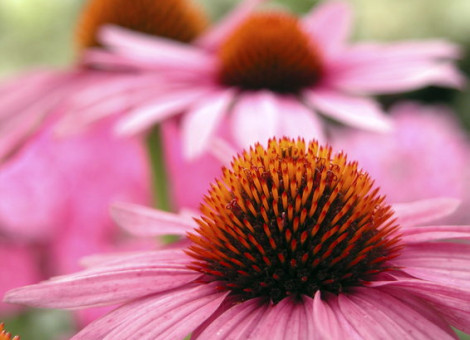Echinacea is widely known as an immune boosting herb that is used at the onset of cold and influenza infections. But, if you’re only using it when your nose starts to “run” and throat gets scratchy, you’re missing out. According to a new publication in the Journal of Biomedicine and Biotechnology, in addition to Echinacea’s immune-modulating activity, this traditional Native American treasure also possesses antioxidant and antimicrobial properties which may address conditions ranging from fungal and parasitic infections to poor wound healing.
A current study in the journal Evidence-Based Complementary and Alternative Medicine indicates that Echinacea is, in fact, useful in protecting against upper respiratory infections. In the trial, 175 adult travelers were asked to take an Echinacea root extract (standardized to 4.4 mg alkylamides/day) or a placebo for up to 9 weeks. The study participants were given the respective treatments beginning two-weeks prior to travel and continuing until the end of their flight exposure. They were then surveyed before, immediately after and 4 weeks after their airplane travel. Those receiving the Echinacea extract demonstrated “lower respiratory symptom scores” than the placebo group. The specific findings reveal that, the Echicacea users were approximately 50% less likely to experience severe respiratory symptoms that would necessitate medical treatment. The authors of this double blind, randomized trial concluded that, “Supplementation with standardized Echinacea tablets, if taken before and during travel, may have preventive effects against the development of respiratory symptoms during travel involving long-haul flights”.
Colds and flus aside, the next chapter in the book of echinacea may well focus on a decidedly unexpected bodily organ: the skin. Scientists are particularly interested in the potential of Echinacea for: a) controlling the growth of bacteria associated with acne; b) protecting against nerve damage induced by excessive sun exposure; c) use as an adjunct to the conventional treatment of viral warts. In practical terms, this may mean that you’ll see more products on the market that include Echinacea in creams, lotions and oral supplements directed at consumers with viral conditions such as cutaneous warts.
Study 1 – Applications of the Phytomedicine Echinacea Purpurea … (link)
Study 2 - Randomized, Double Blind, Placebo-Controlled Trial of Echinacea … (link)
Study 3 - The Potential Use of Echinacea in Acne: Control of Propionibacterium … (link)
Study 4 - Neuroprotective Effects of a New Skin Care Formulation Following … (link)
Study 5 - Oral Supplementation with a Nutraceutical Containing Echinacea … (link)
Colds and flus aside, the next chapter in the book of echinacea may well focus on a decidedly unexpected bodily organ: the skin. Scientists are particularly interested in the potential of Echinacea for: a) controlling the growth of bacteria associated with acne; b) protecting against nerve damage induced by excessive sun exposure; c) use as an adjunct to the conventional treatment of viral warts. In practical terms, this may mean that you’ll see more products on the market that include Echinacea in creams, lotions and oral supplements directed at consumers with viral conditions such as cutaneous warts.
To learn more about the studies referenced in today’s column, please click on the following links:
Study 2 - Randomized, Double Blind, Placebo-Controlled Trial of Echinacea … (link)
Study 3 - The Potential Use of Echinacea in Acne: Control of Propionibacterium … (link)
Study 4 - Neuroprotective Effects of a New Skin Care Formulation Following … (link)
Study 5 - Oral Supplementation with a Nutraceutical Containing Echinacea … (link)
Standardized Echinacea Extract May Reduce Travel-Related Illness
Source: Evid Based Complement Alternat Med. 2012;2012:417267. (link)


No comments:
Post a Comment